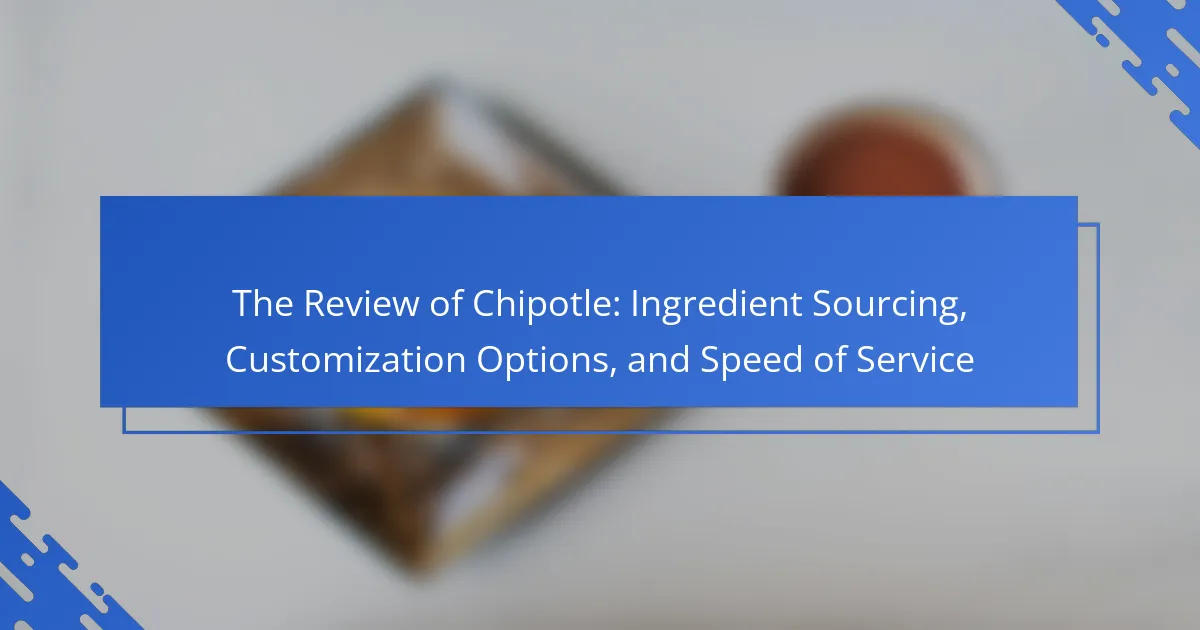Chipotle is a fast-casual restaurant chain known for its Mexican cuisine, offering customizable menu items such as burritos, tacos, and bowls. The restaurant emphasizes high-quality, responsibly sourced ingredients, focusing on sustainability and animal welfare. Chipotle provides a variety of fresh options, accommodating dietary preferences including vegetarian and vegan choices. Additionally, the chain is recognized for its efficient service and quick meal preparation, making it a popular choice for customers seeking both quality and speed in their dining experience.

What is Chipotle and what does it offer?
Chipotle is a fast-casual restaurant chain specializing in Mexican cuisine. It offers customizable menu items, including burritos, tacos, and bowls. Customers can choose from a variety of fresh ingredients. These include meats, beans, rice, salsas, and toppings. Chipotle focuses on high-quality, responsibly sourced ingredients. The brand emphasizes sustainability and animal welfare in its sourcing practices. Chipotle’s menu caters to various dietary preferences, including vegetarian and vegan options. The restaurant chain is known for its efficient service and quick meal preparation.
How does Chipotle source its ingredients?
Chipotle sources its ingredients through a commitment to high-quality, sustainable practices. The company prioritizes sourcing from local farms and suppliers when possible. Chipotle emphasizes the use of organic produce and responsibly raised meats. They avoid artificial ingredients and preservatives in their food. The company also supports animal welfare by sourcing meat from farms that adhere to humane practices. Chipotle’s supply chain is designed to ensure freshness and quality. They work with suppliers who share their values on sustainability and ethical sourcing. This approach is reflected in their menu, which highlights real, whole ingredients.
What are the standards for ingredient sourcing at Chipotle?
Chipotle sources its ingredients based on high standards for quality and sustainability. The company prioritizes organic and non-GMO produce whenever possible. Chipotle also emphasizes the use of humanely raised animals. This includes sourcing meat from farms that do not use antibiotics or added hormones. The company aims to support local and sustainable farming practices. Chipotle’s commitment to responsible sourcing is evident in its Food With Integrity philosophy. This approach reflects their dedication to transparency and ethical food sourcing.
How does Chipotle ensure sustainability in its ingredient sourcing?
Chipotle ensures sustainability in its ingredient sourcing by prioritizing responsibly sourced ingredients. The company focuses on sourcing meat from animals raised without antibiotics or added hormones. It also emphasizes the use of organic and locally sourced produce when possible. Chipotle partners with suppliers who adhere to sustainable farming practices. This includes supporting animal welfare and environmentally friendly farming methods. As a result, Chipotle has committed to using only 100% responsibly raised pork and chicken. The company also aims to source 50% of its beans from organic farms. These efforts contribute to reducing the environmental impact of its supply chain.
What customization options are available at Chipotle?
Chipotle offers a variety of customization options for its menu items. Customers can choose from different bases such as burritos, bowls, tacos, or salads. Each base can be filled with a selection of proteins, including chicken, steak, barbacoa, carnitas, or sofritas. Additionally, customers can select from various toppings like rice, beans, salsas, cheese, and guacamole.
Chipotle allows for modifications such as extra ingredients or omitting certain items. Customers can also choose their spice level by selecting mild, medium, or hot salsas. This flexibility enables patrons to create a meal that suits their individual tastes and dietary preferences.
How do customers personalize their meals at Chipotle?
Customers personalize their meals at Chipotle by selecting from various ingredients and options. They can choose from burritos, bowls, tacos, or salads as their base. Customers then pick proteins such as chicken, steak, barbacoa, carnitas, or sofritas. They have the option to add rice, beans, and a variety of salsas. Additional toppings include cheese, sour cream, guacamole, and lettuce. Each ingredient can be customized in quantity or omitted entirely. This flexibility allows customers to create meals tailored to their preferences and dietary needs. Chipotle’s assembly line format facilitates quick customization, enhancing the overall experience.
What are the most popular combinations for customization?
The most popular combinations for customization at Chipotle include burritos with chicken, black beans, and pico de gallo. Another favored option is the bowl with steak, brown rice, and corn salsa. Tacos featuring carnitas, lettuce, and cheese are also highly requested. Additionally, many customers enjoy salads topped with sofritas, guacamole, and vinaigrette. These combinations reflect customer preferences for protein, beans, and fresh toppings. Chipotle’s flexible menu allows for these popular pairings to cater to diverse tastes.
How fast is the service at Chipotle?
The service at Chipotle is generally fast, averaging around 5 to 10 minutes during peak hours. This speed is due to their assembly line style of food preparation. Customers typically experience quick service for made-to-order meals. Chipotle’s efficient layout and trained staff contribute to this rapid service. According to customer reviews and operational assessments, most patrons receive their orders promptly. This efficiency is a key factor in Chipotle’s popularity.
What factors influence the speed of service at Chipotle?
The speed of service at Chipotle is influenced by several factors. These include staff training, kitchen layout, and order complexity. Well-trained staff can prepare food quickly and efficiently. The kitchen layout impacts how fast ingredients can be accessed and assembled. Simple orders take less time than complex ones with multiple customizations. Additionally, peak times can lead to longer wait times due to higher customer volume. Efficient technology systems for order processing also contribute to faster service. Overall, these factors collectively determine how quickly customers receive their meals at Chipotle.
How does Chipotle’s service speed compare to other fast-casual restaurants?
Chipotle’s service speed is generally faster than many other fast-casual restaurants. On average, Chipotle customers experience a wait time of about 5-10 minutes. This is competitive compared to the industry average of 10-15 minutes for similar establishments. Chipotle’s streamlined assembly line model contributes to its efficiency. The setup allows for quick customization without lengthy delays. According to customer reviews, many patrons appreciate the speed of service. This efficiency has helped Chipotle maintain a strong customer satisfaction rating.
What are the challenges Chipotle faces in ingredient sourcing?
Chipotle faces several challenges in ingredient sourcing. One major challenge is ensuring the quality and safety of ingredients. The company prioritizes fresh, organic, and local produce. However, sourcing these ingredients consistently can be difficult due to seasonal availability and regional supply issues.
Another challenge is maintaining supply chain transparency. Chipotle aims to source responsibly, but verifying the practices of suppliers can be complex. Price volatility also impacts ingredient sourcing. Fluctuating prices for key ingredients like avocados and meat can affect menu pricing and profitability.
Additionally, Chipotle must navigate regulatory compliance. Food safety regulations vary by region and can complicate sourcing efforts. Lastly, competition for high-quality ingredients poses a challenge. Other restaurants and food producers may drive up demand, making it harder for Chipotle to secure necessary supplies.
How do supply chain issues affect ingredient availability?
Supply chain issues directly reduce ingredient availability. Disruptions such as transportation delays or supplier shortages impact the flow of ingredients. For example, a natural disaster can halt production at farms. This leads to fewer ingredients reaching restaurants. Consequently, Chipotle may face menu limitations or ingredient substitutions. Historical data shows that during the COVID-19 pandemic, many restaurants struggled with ingredient shortages. These shortages can result in increased costs and reduced menu options for consumers.
What measures does Chipotle take to mitigate sourcing challenges?
Chipotle takes several measures to mitigate sourcing challenges. The company prioritizes sourcing ingredients from local suppliers when possible. This approach reduces transportation costs and ensures fresher produce. Chipotle also establishes long-term relationships with farmers. These partnerships foster reliability and quality in ingredient sourcing. Additionally, the company invests in sustainable farming practices. This investment helps secure a stable supply of key ingredients. Chipotle’s commitment to transparency in sourcing builds consumer trust. The company shares information about its suppliers and sourcing practices. This transparency enhances accountability and consumer confidence in the brand.
What are the benefits of Chipotle’s customization options?
Chipotle’s customization options provide significant benefits to customers. They allow individuals to tailor their meals according to personal preferences. This flexibility enhances customer satisfaction by accommodating dietary restrictions and taste preferences. For example, customers can choose from various proteins, toppings, and salsas. This variety enables the creation of unique meals for each visit. Additionally, customization promotes healthier eating habits by allowing control over ingredients. A survey indicated that 70% of customers appreciate the ability to personalize their orders. Overall, Chipotle’s customization options contribute to a more enjoyable dining experience.
How does customization enhance customer satisfaction at Chipotle?
Customization at Chipotle significantly enhances customer satisfaction by allowing patrons to tailor their meals to personal preferences. Customers can choose from a variety of ingredients, including different proteins, toppings, and salsas. This flexibility empowers customers to create meals that align with their dietary needs and taste preferences. Research indicates that 75% of customers appreciate the ability to customize their orders. Additionally, customization fosters a sense of ownership over the dining experience. When customers feel in control, their overall satisfaction increases. Chipotle’s commitment to fresh ingredients further amplifies this satisfaction, as patrons enjoy high-quality, personalized meals.
What role does customization play in Chipotle’s brand identity?
Customization is central to Chipotle’s brand identity. It allows customers to create personalized meals, enhancing their dining experience. This approach fosters customer engagement and loyalty. Chipotle’s build-your-own model empowers consumers to select ingredients according to their preferences. The brand emphasizes fresh, high-quality ingredients, aligning with customization. According to a 2021 survey, 70% of customers appreciate the ability to customize their orders. This feature differentiates Chipotle from competitors, reinforcing its market position. Customization also reflects Chipotle’s commitment to customer satisfaction and transparency.
What tips can enhance the Chipotle dining experience?
To enhance the Chipotle dining experience, consider customizing your order. Chipotle offers a variety of fresh ingredients. Choosing different salsas can elevate flavor profiles. Adding extra toppings, like guacamole, enhances texture and taste. Opting for a burrito bowl allows for more ingredient variety. Ordering online can save time during peak hours. Familiarizing yourself with the menu can help in making informed choices. Engaging with staff can lead to recommendations based on personal preferences.
Chipotle is a fast-casual restaurant chain that specializes in Mexican cuisine, offering customizable menu items such as burritos, tacos, and bowls made with high-quality, responsibly sourced ingredients. The article reviews Chipotle’s ingredient sourcing practices, highlighting its commitment to sustainability and animal welfare, as well as the challenges it faces in maintaining ingredient availability. Additionally, it examines the extensive customization options available to customers, which enhance their dining experience and satisfaction, and evaluates the speed of service compared to other fast-casual restaurants. Overall, the article provides a comprehensive overview of Chipotle’s operational practices and customer-centric approach.
